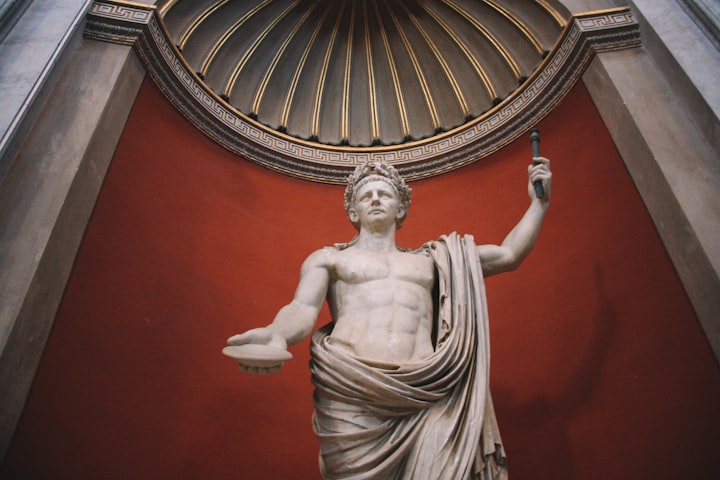What might you do if you notion your united states of america was on the direction to tyranny?
if you noticed one man gaining too much electricity, might you attempt to forestall him?
although that man became one among your closest buddies and allies?
those were the questions haunting Roman Senator Marcus Junius Brutus in forty four BCE,
the year Julius Caesar would be assassinated.
Opposing unchecked electricity wasn't just a political matter for Brutus;
it became a non-public one.
He claimed descent from Lucius Junius Brutus,
who had helped overthrow the tyrannical king called Tarquin the Proud.
in place of seizing energy himself,
the elder Brutus led the people in a rousing oath
to by no means again permit a king to rule.
Rome became a republic
primarily based at the principle that no one man should hold an excessive amount of strength.
Now, 4 and a half centuries later, this principle became threatened.
Julius Ceasar's upward push to the powerful position of consul
have been dramatic.
Years of military triumphs had made him the wealthiest man in Rome.
And after defeating his rival Pompey the incredible in a bitter civil warfare,
his electricity became at its peak.
His victories and tasks, including distributing lands to the negative,
had made him popular with the general public,
and many senators vied for his desire by means of showering him with honors.
Statues had been built, temples were committed,
and an entire month turned into renamed, nevertheless called July these days.
greater importantly, the name of dictator,
meant to grant brief emergency powers in wartime,
had been bestowed upon Caesar several times in succession.
And in forty four BCE, he was made dictator perpetuo,
dictator for a potentially limitless term.
All of this become too much for the senators
who feared a return to the monarchy their ancestors had fought to abolish,
in addition to those whose personal energy and ambition
were impeded by Caesar's rule.
a collection of conspirators calling themselves the liberators
started to secretly discuss plans for assassination.
leading them had been the senator Gaius Cassius Longinus
and his buddy and brother-in-regulation, Brutus.
becoming a member of the conspiracy turned into no longer an smooth desire for Brutus.
even though Brutus had sided with Pompey within the ill-fated civil struggle,
Caesar had for my part intervened to shop his life,
no longer most effective pardoning him however even accepting him as a near marketing consultant
and raising him to essential posts.
Brutus became hesitant to conspire towards the person who had treated him like a son,
but in the end,
Cassius's insistence and Brutus's very own fear of Caesar's goals gained out.
the instant they were looking ahead to got here on March 15.
At a senate meeting
held shortly earlier than Caesar was to leave on his next navy marketing campaign,
as many as 60 conspirators surrounded him,
unsheathing daggers from their togas and stabbing at him from all facets.
as the story is going,
Caesar struggled fiercely until he saw Brutus.
despite the well-known line, "Et tu, Brute?" written by way of Shakespeare,
we do not know Caesar's real demise words.
some historic resources declare he said nothing,
whilst others file the word, "and also you, child?",
fueling speculation that Brutus can also have virtually been Caesar's illegitimate son.
but all agree that after Caesar noticed Brutus amongst his attackers,
he covered his face and gave up the fight,
falling to the ground after being stabbed 23 instances.
unluckily for Brutus,
he and the opposite conspirators had underestimated Caesar's recognition
the various Roman public,
a lot of whom saw him as an powerful chief,
and the senate as a corrupt aristocracy.
within moments of Caesar's assassination, Rome changed into in a kingdom of panic.
maximum of the opposite senators had fled,
whilst the assassins barricaded themselves on the Capitoline Hill.
Mark Antony, Caesar's pal and co-consul,
turned into swift to capture the upper hand,
handing over a passionate speech at Caesar's funeral days later
that whipped the crowd into a frenzy of grief and anger.
As a result, the liberators were pressured out of Rome.
the following energy vacuum brought about a chain of civil wars,
during which Brutus, dealing with positive defeat, took his very own lifestyles.
paradoxically, the remaining result
will be the opposite of what the conspirators had was hoping to accomplish:
the give up of the Republic
and the concentration of strength beneath the workplace of Emperor.
opinions over the assassination of Caesar had been divided from the start
and feature remained so.
As for Brutus himself,
few historical figures have inspired such a conflicting legacy.
In Dante's "Inferno," he become placed within the very middle of Hell
and eternally chewed by using devil himself for his crime of betrayal.
but swift's "Gulliver's Travels"
defined him as one of the maximum virtuous and benevolent human beings to have lived.
the translation of Brutus as both a selfless fighter in opposition to dictatorship
or an opportunistic traitor
has shifted with the tides of history and politics.
but even these days, over 2000 years later,
questions about the rate of liberty,
the battle among personal loyalties and established ideals,
and unintended results continue to be extra applicable than ever.
About the Creator
Enjoyed the story? Support the Creator.
Subscribe for free to receive all their stories in your feed. You could also pledge your support or give them a one-off tip, letting them know you appreciate their work.






Comments
There are no comments for this story
Be the first to respond and start the conversation.